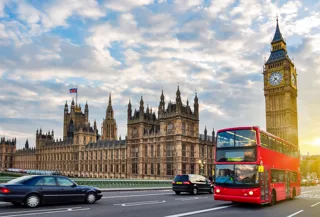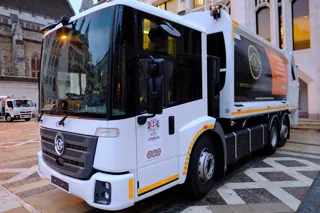Long replacement cycles for vans could leave fleet operators facing daily charges when clean air zones (CAZs) are introduced in London and other major cities.
Euro 6 – the latest emissions standard – has been chosen as the diesel benchmark for London’s ultra-low emission zone (ULEZ) and is also expected to be used as the threshold for many CAZs.
However, current penetration rates of Euro 6 vans, across fleets of all sizes, mean many operators will be unable to ensure all their vehicles are fully compliant.
In addition to London, there are five other cities – Birmingham, Derby, Leeds, Nottingham and Southampton – which have to introduce CAZs before 2020.
The Government has identified a further 23 local authorities in its air quality plan where CAZs could be introduced to reduce emissions.
Its CAZ framework suggests Euro 6 diesel for cars and vans, and Euro VI for trucks, as minimum standards.
Local authorities will need to set out their initial plans by March. These will be followed by final plans in December.
Fleet market report
Detailed analysis from Sewells, in its UK LCV Fleet Market report, suggests that van fleets will have to renew almost two-thirds of their vehicles if they wish to avoid potential charges.
More than 60% of sub-two-tonne vans are not Euro 6 compliant, while just two in five (40%) vans weighing 2.5-3.5 tonnes reach the required standard, the report says.
With companies typically replacing vans every five-eight years, the Freight Transport Association (FTA) is warning that many businesses will be locked into lease agreements which will be costly to get out of.
“For those whose businesses operate inside a CAZ, a period of grace, giving them extra time to comply, would provide much-needed breathing space,” said Elizabeth de Jong, FTA director of UK Policy.
The report says it is small operators, with six-25 vans, who are significantly more likely to have fully compliant fleets. One-in-four (24%) said the penetration rate of Euro 6 vans in their fleet was currently between 91-100%. That compared to fewer than one-in-five (17%) of large van fleets (101-plus vehicles) and just 13% of companies, operating between 26 and 100 vans.
The British Vehicle Rental and Leasing Association (BVRLA) has urged policymakers to support business through a managed transition; allowing operators time to make adjustments in line with their normal replacement cycles, without incurring unnecessary additional costs.
BVRLA chief executive Gerry Keaney said: “We are calling for a carefully managed transition that encourages people and businesses to use more sustainable vehicles and modes of transport.
“You only have to look at some of the recent adverse reaction from the taxi community in Leeds to see have the potential to significantly impact local people and businesses.”
Leeds City Council is consulting on proposals to charge cabbies £12.50 a day to enter its CAZ unless they drive an ultra-low emission vehicle (ULEV) – either petrol hybrid or electric. However, cars and vans are exempt from its CAZ proposals.
In London, only diesel Euro 6-compliant cars and vans will avoid a £12.50 daily fee, with operators of non-compliant vehicles facing an annual charge of up to £4,562.50.
Despite the potential cost, 41% of van fleets said charges would not be high enough to change their fleet policy, compared with almost half (48%) of company car operators and less than a third (30%) of mixed fleets.
However, some are determined to adhere to air quality standards. The report states that one in four van fleets will only operate vehicles that can enter an air quality zone without paying a charge. That compares with almost a third (30%) of company car operators and one-in-five (22%) of mixed fleets.
Fleets investigate zero emission vehicles
Increasing concerns around air quality, as well as the threat of even tighter emissions standards, is persuading some to go even further and investigate the adoption of alternative fuel vehicles (AFVs).
One-in-five (22%) company car operators said they were investigating zero emission vehicles, compared with 30% of mixed fleets and more than a third (35%) of van operators.
The largest van fleet in the UK, Royal Mail, has started to future-proof its delivery service with the acquisition of 100 Peugeot Partner L2 Electric vans.
Paul Gatti, Royal Mail fleet director, said the move puts the postal service “on the front foot for future changes in emissions legislation”.
“Emissions are an important issue for us and we are continually looking at ways to reduce our carbon footprint and our impact on air quality,” he said.
“Improving the efficiency of our fleet by introducing electric vans is just one example of this. Our research has shown that electric vans are a good operational fit with our business.”
However, British Gas has had to push back its 10% EV van target a further three years to 2020, after it blamed shortcomings in the available technology.
The UK energy provider trialled 28 Nissan e-NV200s in 2013 and then went on to order an additional 100 on a five-year contract in 2014. At the time, the plan was to expand the electric van fleet to around 1,300 vehicles out of its 13,000 commercial vehicles. However, it currently has just 113 on fleet.
It is involved, however, with a 12-month trial of Ford’s new plug-in hybrid electric (PHEV) Transit Custom, which also includes Transport for London, Addison Lee, DPD, Speedy Services and the Metropolitan Police.
The Sewells research asked respondents how they expected the proportion of alternative fuel light commercial vehicles on their fleet to increase over the coming few years. Almost a quarter (24%) of van-only fleets think that at least 5% of their light commercial vans will be AFVs in five years.
Mixed fleets were more optimistic, with 41% saying they expected the share of AFVs operated to be at least 5%.






















Login to comment
Comments
No comments have been made yet.